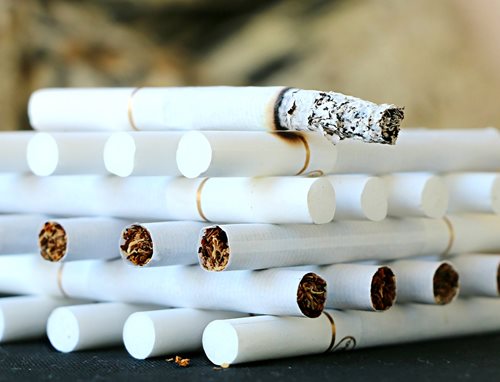Have you ever thought about what smoking really does to you? Smoking will account for nearly one and a half million premature adult deaths this year alone. This makes the list as the most preventable cause of death in the United States. More than half of the professional long-haul drivers are current cigarette smokers! This is significantly higher than the general working population (51% vs. 19%). Drivers are the backbone of our economy and we need them healthy and smoke-free. Living a healthy lifestyle is important to keep drivers on the road for years to come.

Smokey Poisons
Tobacco smoke consists of 7,000 toxic chemicals. After each puff on a cigarette, these poisonous toxins fill your lungs. From there, the smoke filled blood flows through your arteries and then carries the poisons to the tissues in every part of your body. It is only fair that we list these toxic chemicals that are entering the body as people light up and puff away.
Cancer-Causing Chemicals:
- Formaldehyde (used to embalm dead bodies)
- Benzene (found in gasoline)
- Polonium 210 (radioactive and very toxic)
- Vinyl Chloride (used to make pipes)
Toxic Metals:
- Chromium (used to make steel)
- Arsenic (used in pesticides)
- Lead (used in paint)
- Cadmium (used in making batteries)
Poisonous Gases:
- Carbon monoxide (found in car exhaust)
- Hydrogen cyanide (used in chemical weapons)
- Ammonia (used in household cleaners)
- Butane (used in lighter fluid)
- Toluene (found in paint thinners)
Your body has to work overtime to fight the damage caused by these chemicals found in tobacco smoke. It puts constant stress on the body and your immune system.
Cancer
Smoking can cause cancer almost anywhere in your body. Mouth, esophagus, bladder, throat, and lung cancer are just a few. The chance of cancer increases significantly when someone smokes. Smoking damages our bodies DNA that is our cell’s “instruction manual”. The poisons in cigarette smoke weaken the tumor fighters and a cell can begin growing out of control and create a cancer tumor.
Heart and Respiratory Disease
Smoking increases the chance of having a heart attack or stroke due to the plaque buildup in your arteries. Plaque clogs and narrows your arteries. This puts extra strain on the cardiovascular system, which increases your risk tenfold over non-smokers. It can also change your blood chemistry. The blood vessels react to the poisons in tobacco smoke and raise your heart rate and blood pressure. Chemical changes caused by smoking can also create deadly clots that block blood flow to your heart, brain, and legs.
Smoking also can cause lung disease. It damages tiny brush-like cilia that line your airways. They act as brushes that sweep out mucus and dirt so your lungs stay clear. Over time, smoking harms and destroys these brushes. Diseases such as COPD, emphysema, and chronic bronchitis plague many smokers. There is no cure for COPD in which people die slowly from the lack of air. It will make you feel weak from the lack of oxygen. Eventually, many COPD sufferers have to live on an oxygen tank.
Quitting
It could help save your life!
Learning how to identify triggers and changing your mindset about smoking will help you to become a smoke-free driver in no time. Triggers such as boredom, anger, and stress out on the road can lead to reaching for their pack of smokes. Quitting can be difficult but the payoffs are worth it in the end. Quitting reduces the risk of lung cancer by half after 10+ years of being smoke-free, the risk of stroke falls to about the same as a nonsmoker after 5 years of quitting, and one year after quitting smoking your risk of a heart attack drops sharply.
Recovery from nicotine addiction involves both the physical and mental healing habits. Physically your body will react once you stop smoking. Your body is no longer getting nicotine and can present flu-like symptoms during the first couple of weeks. It is essential that you take care of yourself during this phase. During the first week make sure that you eat a well-balanced diet. Don’t skip meals it could cause low blood sugar, which can trigger you to smoke.
Daily survival tips while trying to nip smoking in the butt are:
- Take a multivitamin
- Avoid places and people you connect with smoking
- Drink plenty of fluids (water)
- Walk daily
- Distract yourself
- Reward yourself
- Get more sleep
- Change your habits
- Do something to reduce your stress
- Delay when the urge hits to smoke. Waiting 3-5 minutes can help stave off most cravings.
- Develop a plan of attack when you have a psychological urge to smoke, how you choose to react to a craving either increase or decreases its power over you.
- Most of all believe in you and be patient…over time you will heal and learn how to live your life smoke-free.
Healthy Lifestyle
Quitting is essential for overall wellness. As you lead a smoke-free lifestyle you will begin to notice positive changes such as easier breathing with less shortness of breath, your truck will smell better, stains on your teeth and nails will start to fade. As a nonsmoker, you will also see financial rewards as you save money from not purchasing cigarettes. Enjoy the positive influences of being a non-smoker and share them within the driving community.